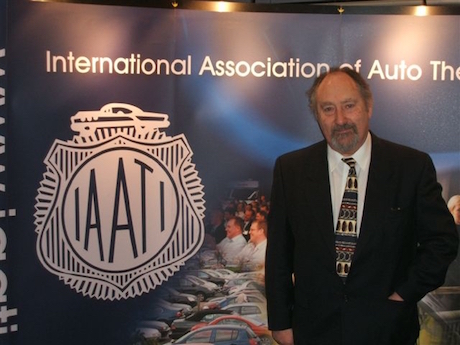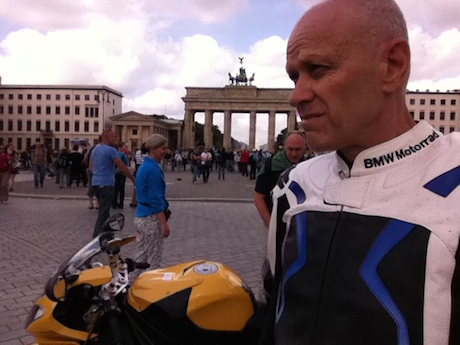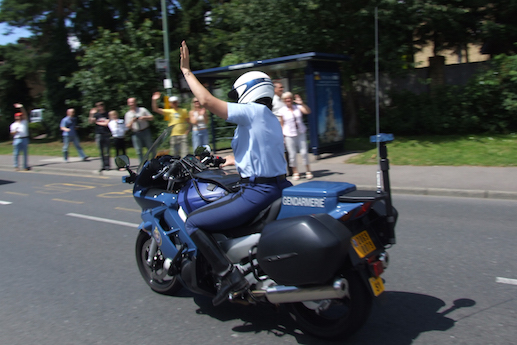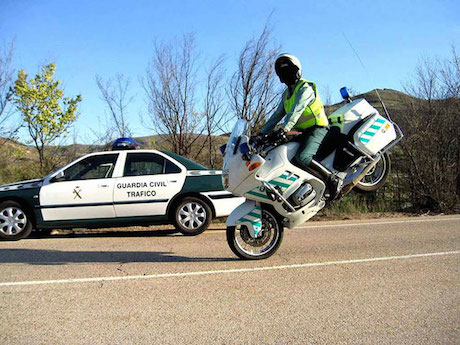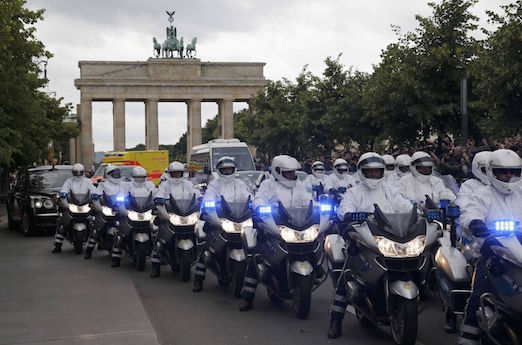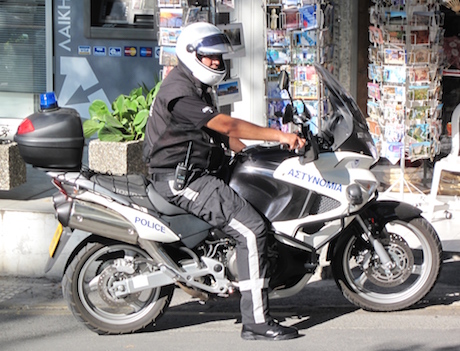If you’re heading off to ride through Europe, beware that the European cops, the guardians of the roads, who will be eagerly watching you and how you ride.
Remember, France Spain and Italy together with Germany employ 60% of all Europe’s police officers.
FRANCE
The Gendarmerie will “eyeball” anyone crossing “La Manche”, Brits in particular, as we attempt to ride on the right (or wrong) side of their ‘routes’ as many collisions involving visitors happen within a few miles of a ferry port.
Why us? Well the French still think we’re daft for using the wrong side of the road anyway and we could argue that if it wasn’t for Napoleon and Hitler they too would be driving on the left like us.
Showing any attitude at all to the ‘Route National’ traffic police can get you into big trouble, particularly if they have ordered you to stop. Advice is don’t argue just do it.
They will appreciate your attempts to speak their language, of course, and after all they might simply want to inform you that your pannier fell off 5km back or there’s a blockage in the road ahead.
If you don’t speak French, however, it’s no big deal as they communicate perfectly well by using a series of grunts and chin movements operated by a hand inside their holster which is all surprisingly effective! The sight of them drawing a gun and pointing it at you should reduce you to a gibbering wreck.
Don’t laugh or smile in their presence either. Any display of subservience will be better received than you aggressively waving your reflective jackets, triangle, passport, and driving licence at the officers while at the same time pointing to your GB sticker, spare light bulbs and breathalyser.
If you are pulled over by the ‘Rats Noire’ they are likely to want to smell your breath for alcohol. French breathalysers are currently set to the strength of just one wine gum as 30% of all their annual 40,000 accidents are drink related.
It’s far more likely however that these gendarmes will just grunt, wave their arms, blow their whistle a bit and send you on your way!
When you do, watch the speed limit! You will incur an on-the-spot fine if you get caught and if you’re more than 50km/h over the legal limit you could be jailed for three months, your vehicle seized and you, your wife and children could be made to work in a sweat shop in Marseilles.
Should you have a crash and it’s your fault then you will find police officers will materialise almost immediately from an adjacent bush; if it’s not your fault, however, then it’s likely you will be hanging around for some time waiting for them to arrive.
If you do have a prang the other party may well shove a “Constat Amiable” form (amiable declaration) under your nose to sign. This is actually standard procedure but if you have never seen one before ring your insurance company for advice. Some forms have been known to translate as “It’s all my fault and I will pay this person whatever they want for the rest of my life and bequeath both my house and classic Aston Martin to them in my will”.
SPAIN
The Spanish Guardia Civil will also be waiting for you when you cross the border and while they have a similar philosophy to the French you won’t see either of them communicating – they don’t get on!
Don’t “eyeball them’ as staring is seen as an admission of guilt to some heinous offence you’ve committed on your journey to their border.
In small Spanish townships the local “Cuerpo Nacional” or Policia usually allow parking anywhere within reason but only by the locals and not visitors.
They will explain that you will need to buy parking tickets from a tobacconists shop and that you should place your bikes outside even numbered houses on a Thursday and odd numbers on a Tuesday (it may be the other way round), this of course does not apply to holidays, Saints days or days with a ‘th’ in it.
Also don’t ever park in a disabled bay, carry a dog in your lap or have an unreadable number plate as you will incur an on the spot fine of 50 Euros (50% reduction for prompt payment) or less if a receipt is not required.
Should you find yourself on a one-way street, remember stay to the right and allow for oncoming traffic to pass.
Take note that if you have occasion to speak to the “Guardia Civil” they will remind you that they are the really important Policia and will appear to have little time for – well anybody. That said you will only ever really see them nowadays at the centre of a traffic jam which to be honest wouldn’t exist if they weren’t there.
Get to know them socially however and they will drink you under the table and attempt to adopt one of your family before you sober up.
ITALY
If you cross the border into Italy then be prepared for close formation driving in both towns and villages.
The police whether it’s the Guardie, Vigili or Carabinieri all appear strict with foreigners and they are known to get rather animated. However if you are important, good looking or you have a nice bike you should be OK.
In big towns and cities you must try not to indicate when changing lanes, it only warns other motorists of your intentions and they will speed up and never let you in.
Also making eye contact with other riders/drivers always means that they have the right of way.
Remember, in a country of about 25,000 different individual police forces where laws change every 3km, nothing is for certain.
That said, the charm of the carabinieri, if they like you, could see you being introduced to their complete family (usually at least 800) and you might never want to leave Italy again.
GERMANY
Here, the traffic is controlled clinically and the uber-efficient Polizei will hear no excuses for you not knowing where you are going.
An overload of road signs may baffle you but don’t stop to read them as you are likely to be towed away if stationary for longer than 10 seconds. Bizarrely it’s also illegal to run out of fuel and dangerous to indicate when entering a roundabout.
Many vehicles including lorries, the odd plant equipment and caravans parked at the side of the road are used by the Polizei for their speed cameras filming your every transgression for which you will be traced and fined.
At the scene of an accident don’t sign anything for an Unfallhelfer (helpful bystander) who seem to appear out of nowhere. Take advice first as these parasites can often be after your signature transferring to them a power of attorney or for simply taking out a loan.
CYPRUS
OK, there are many other countries in Europe and they all have their peculiarities in laws and police, but we have singled out Cyprus for special mention as it has the worst fatal accident record in Europe. They do, however, drive on the left.
You’ll have your work cut out driving around the thousands of potholes in the roads but it will answer the question as to why most drivers appear drunk and why none of them drive in a straight line.
While you’re learning this slalom type riding avoid at all costs vehicles with previous extensive damage to the bodywork as most of them are all looking for a suitable accident to be involved in. “Staged accidents” evolved here.
The majority of police in Cyprus have their blue lights on all of the time so it’s often difficult to know if you are being stopped or they’re simply going home for tea.
If you are stopped, it may be to inform you that it’s compulsory to wear sunglasses and just FYI smoking in a car with a person under the age of 16 is an offence.
However as one senior Cypriot police officer suggested “We love our visitors and advise them that in the countryside either to drive on the right or the left and if it’s really hot just drive in the shade”.
ABOUT THE AUTHOR*
Dr German raced in the Isle of Man TT and other European circuits, has a degree in International Autocrime, is part of the UK Motor Cycle industry’s Crime Reduction Group and past president of the International Association of Auto Theft Investigators (UK).
